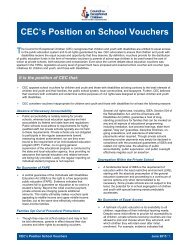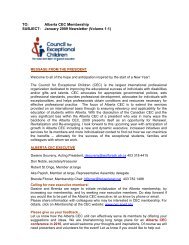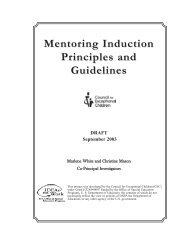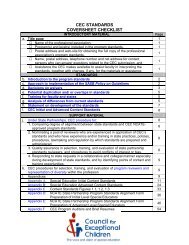What Every Must Know Special Educator - Council for Exceptional ...
What Every Must Know Special Educator - Council for Exceptional ...
What Every Must Know Special Educator - Council for Exceptional ...
Create successful ePaper yourself
Turn your PDF publications into a flip-book with our unique Google optimized e-Paper software.
system to make more flexible responses to changes<br />
in the behavior of individual pupils and to changing<br />
conditions in schools and society, and (b) to permit all<br />
elements of the system to influence the policies and<br />
programs of the others.<br />
<strong>Special</strong> education must provide an administrative<br />
organization to facilitate achievement <strong>for</strong> children<br />
with exceptionalities of the same educational goals<br />
as those pursued by other children. This purpose can<br />
be achieved through structures that are sufficiently<br />
compatible with those employed by regular education<br />
to ensure easy, unbroken passage of children across<br />
regular-special education administrative lines <strong>for</strong><br />
whatever periods of time may be necessary, as well<br />
as by structures that are sufficiently flexible to adjust<br />
quickly to changing task demands and child growth<br />
needs.<br />
The major purpose of the special education administrative<br />
organization is to provide and maintain those<br />
environmental conditions in schools that are most<br />
conducive to the growth and learning of children with<br />
special needs.<br />
Under suitable conditions, education within the<br />
regular school environment can provide the optimal<br />
opportunity <strong>for</strong> most children with exceptionalities.<br />
Consequently, the system <strong>for</strong> the delivery of special<br />
education must enable the incorporation of special<br />
help and opportunities in regular educational settings.<br />
Children should spend only as much time outside<br />
regular class settings as is necessary to control learning<br />
variables that are critical to the achievement of<br />
specified learning goals.<br />
Paragraph 3 - Scope of Program<br />
Education <strong>for</strong> children and youth with exceptionalities<br />
requires the well planned and purposeful coordination<br />
of many disciplines. <strong>Special</strong> education is a cross-disciplinary,<br />
problem-oriented field of services which is<br />
directed toward mobilizing and improving a variety<br />
of resources to meet the educational needs of children<br />
and youth with exceptionalities.<br />
Paragraph 4 - The Goal and<br />
Commitment of <strong>Special</strong> Education<br />
The fundamental purposes of special education are<br />
the same as those of regular education: the optimal<br />
development of the student as a skillful, free, and<br />
purposeful person, able to plan and manage his or her<br />
own life and to reach his or her highest potential as an<br />
individual and as a member of society. Indeed, special<br />
254 whAt every SpeCiAl eduCAtor muSt <strong>Know</strong><br />
education developed as a highly specialized area of<br />
education in order to provide children with exceptionalities<br />
with the same opportunities as other children<br />
<strong>for</strong> a meaningful, purposeful, and fulfilling life.<br />
Perhaps the most important concept that has been<br />
developed in special education as the result of experiences<br />
with children with exceptionalities is that of<br />
the fundamental individualism of every child. The<br />
aspiration of special educators is to see every child as<br />
a unique composite of potentials, abilities, and learning<br />
needs <strong>for</strong> whom an educational program must be<br />
designed to meet his or her particular needs. From<br />
its beginnings, special education had championed the<br />
cause of children with learning problems. It is as the<br />
advocates of such children and of the concept of individualization<br />
that special education can come to play a<br />
major creative role in the mainstream of education.<br />
The special competencies of special educators are<br />
more than a collection of techniques and skills. They<br />
comprise a body of knowledge, methods, and philosophical<br />
tenets that are the hallmark of the profession.<br />
As professionals, special educators are dedicated to<br />
the optimal education of children with exceptionalities<br />
and they reject the misconception of schooling that is<br />
nothing but custodial care.<br />
The focus of all education should be the unique learning<br />
needs of the individual child as a total functioning<br />
organism. All educators should recognize and accept<br />
that special and regular education share the same<br />
fundamental goals.<br />
<strong>Special</strong> education expands the capacity of schools to<br />
respond to the educational needs of all students.<br />
As advocates of the right of all children to an appropriate<br />
education, special educators affirm their<br />
professionalism.<br />
Paragraph 5 - Educational Environments<br />
<strong>for</strong> <strong>Exceptional</strong> Students<br />
<strong>Special</strong> education takes many <strong>for</strong>ms and can be<br />
provided with a broad spectrum of administrative arrangements.<br />
Children with special educational needs<br />
should be served in regular classes and neighborhood<br />
schools insofar as these arrangements are conducive<br />
to good educational progress. The <strong>Council</strong> believes<br />
that the goal of educating children with exceptionalities<br />
together with children without exceptionalities is<br />
desirable if the individual program is such that it will<br />
enhance the child’s (with exceptionalities) educational,<br />
social, emotional, and vocational development.









